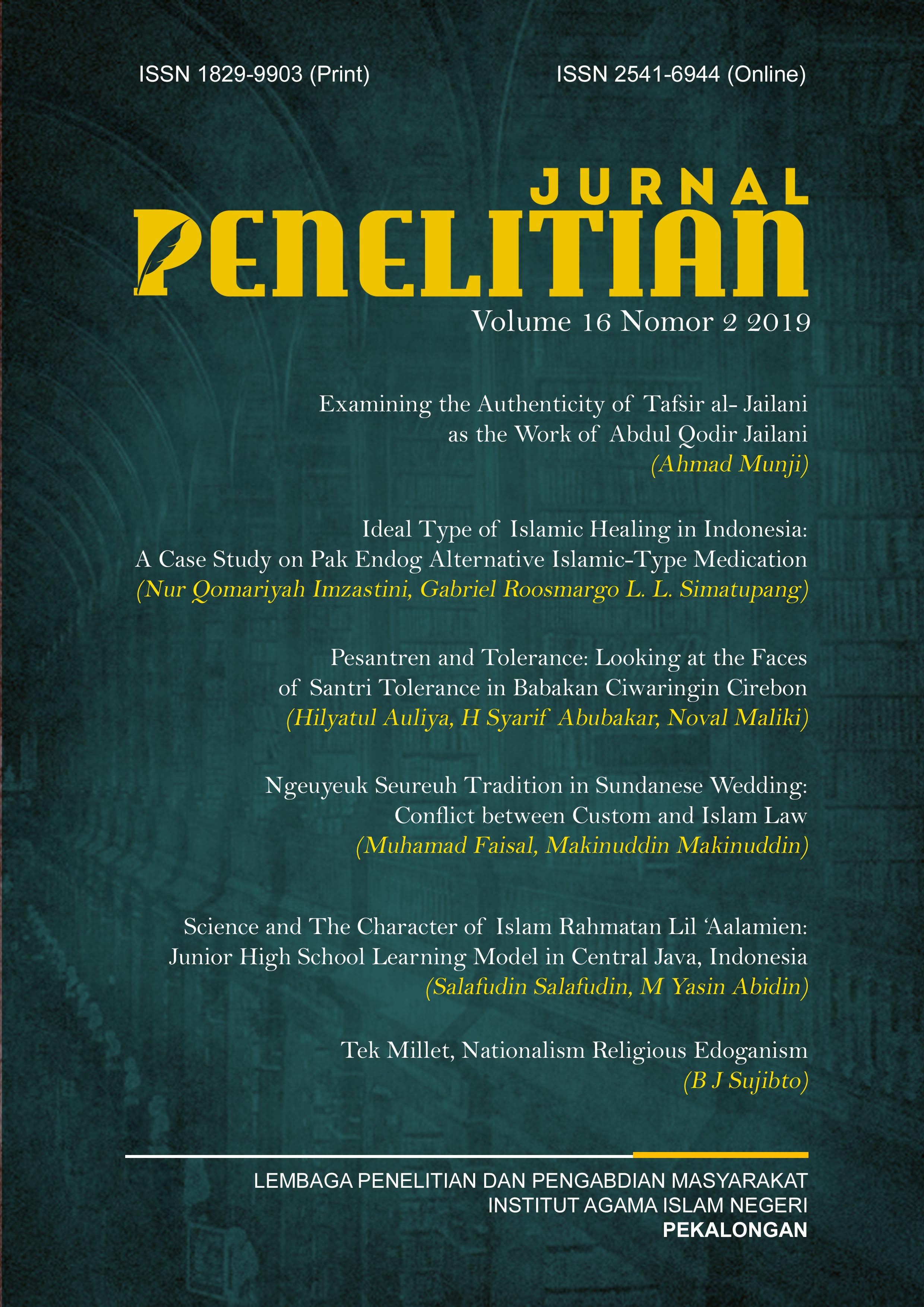Women, Reconciliation Right and Gender Justice in Islam Family Law
Main Article Content
Abstract
Religious teachings are considered to have long oppressed women. Teachings having been dominated by men
have been used as justifications for the perception of society that is very detrimental to women. This article
discusses the gap of understanding on women's rights to reconcile with their husband who have divorced
them, viewed from the perspective of Islamic scholars and Islamic law. In this case, the Qur'an has the
principle that the positions of men and women are equal as a servant, because men and women are created
from the same substance (min nafsin waahidah), the same task (khalifatullah filardh), and have same
obligations (liya'budun). However, Muslim scholars agree that the reconciliation is absolutely the
husband’s right. In gender perspective, women can apply for reconciliation (Rujuk) as their rights to their
husbands. This study conducts analysis using a content analysis approach related to the issue of
reconciliation rights dominated by men (husbands) by means of redeeming the husband's rights that have
been given to them. And in the presence of khulu, the wife also has the right of reconciliation (Rujuk) to the
husband who has divorced her
Article Details

This work is licensed under a Creative Commons Attribution 4.0 International License.

This work is licensed under a Creative Commons Attribution 4.0 International License.
References
Ali, S. S. (2000). Gender and Human Rights in Islam and International Law: Equal Before Allah,
Unequal Before Man?, London: Kluwer Law International.
Ali, Z. (2012). Sosiologi Hukum. Jakarta: Sinar Grafika.
Al-Jaziri, A.R. (1994). al-Fiqh ‘ala Madzahib al-Arba’ah, Beirut: Dar al-Fikr.
Al-Razi, M. F. (n.y). Al-Tqfsir al-Kabir Juz VI. Beirut: Dar al-Kutub al‘Ilmiyah.
Al-Su'udi, A. M. M. I. (n.y). Irsyad al-'Aql al-Salim wa Mazaya al-Qur'an al-Karim Juz I-8.
Beirut: Dar Ihya al-Turats al-'Arabi.
Al-Syaukani, M. A. (n.y). Nail al-Author Jilid VII. Beirut: Dar al-Fikr.
Al-Zamakhsyari, M. U. (1917). Tafsir al-Kasysyaf Juz I. Beirut: Dar al-Fikr.
An-Na’im, A. A. (2010). Dekonstruksi Syari'ah (Jilid 1); Wacana Kebebasan Sipil, HAM
dan Hubungan Internasional dalam Islam. LKIS PELANGI AKSARA.
Anshor, M. U. (2000) “Perempuan dalam Islam”, dalam Jurnal Perempuan, Vol. 20
Azizy, A. Q. (2012). Menggagas Ilmu Hukum Indonesia, dalam Menggagas Ilmu Hukum Progressif
Indonesia. Semarang: Pustaka Pelajar.
Binion, G. (1955). Human Rights: A Feminist Perspective. Human Right Quarterly. 17 (3).
Engineer, A.A. (1994). The Rights of Women in Islam. Jakarta: LSPPA Yayasan Prakarsa.
Garaudy, R. (1993). Hak-hak Asasi dan Islam: Ketegangan Visi dan Tradisi. Islamika, Vol. 2
(October-December).
Harahap, R.D.K.A. (2013). Kesetaraan Laki-Laki Dan Perempuan Dalam Hukum
Perkawinan Islam. Sawwa, 8 (2).
Karmi, G. (1996). Women, Islam and Patriarchalism, in Mai Yamani, edt. Feminism and
Islam: Legal and Literary Perspectives New York: New York University Press.
Khalaf, A.W. (1968). Ilmu Ushulul Fiqh. Mesir: Da’wah Islamiyah Syabab al-Azhar.
King, U. (1995). Religion and Gender. I.rsula King ed. Oxford: Balckwell.
Lembaga Studi Pers dan Pembangunan. (2000). The Universal Declaration of Human Rights: A
Guide for Jurnalists. Deklarasi Universal Hak Asasi Manusia: Panduan bagi Jurnalis.
Jakarta: LSPP.
Mas’udi, M.F. (1997). Perempuan dalam Wacana Keislaman. In Smita Notosusanto dan E.
Kristi Poerwandari (peny.), Perempuan dan Pemberdayaan. Jakarta: Yayasan Obor.
Maududi, A. A. (1982). Human Rights in Islam, Delhi: Ishaat-e-lslam Trust Publications.
Mudzhar, A. (1998). Gelombang Ijtihad Antara Tradisis dan Liberal, Yogyakarta: Titian Ilahi
Press.
Mutahhari, M. (1986). The Rights of Women in Islam. Bandung: Penerbit Pustaka.
Nash, M. and Robyn M. (2019). I Was Completely Oblivious To Gender’: An Exploration
Of How Women In STEMM Navigate Leadership In A Neoliberal, Post-Feminist
Context. Journal of Gender Studies, 28 (4).
Nurhayati, S. (2012). Tinjaun Maslahah Atas Legalitas Praktek Aborsi Bagi Korban Perkosaan,
Studi atas UU No. 36 Tahun 2009 Tentang Kesehatan.
Nyambura, C. (2018). Repoliticising Women’s Rights in Development: Young African
Feminisms at The Cutting Edge. Journal Gender & Development, 26 (3).
Parks, E. and Barta, K. (2018). Are You My Mother? Perpetuating Gender Inequality
Through Listening Expectations and Relational Roles. Journal of Research in Gender
Studies 8(1).
Prasetyo, Hendro dan Sahal, A. (1993). Universalisasi HAM: Tanggapan Islam. Studia
Islamika, 2.
Quthub, S. (1986). Fi Dzilal al-Qur 'an I. Jeddah: Dar al-‘llmi.
Saidah. (2017). Kedudukan Perempuan dalam Perkawinan. Jurnal Al-Maiyyah 10 (2).
Soekanto, S. (2011). Pokok-Pokok Sosiologi Hukum. Jakarta: Rajawali Press.
Soekanto, S., et al. (1988). Pendekatan Sosialogi terhadap Hukum. Jakarta: PT. Bina Aksara.
Sopyan, Y. (2002). Isu-isu Gender dalam Islam. Jakarta: Pusat Studi Wanita UIN Jakarta
bekerjasama dengan McGill-I CI HEP.
Sopyan, Y. (2003). Persepsi Hakim Agama tentang Perceraian, Laporan Penelitian Individu
Lemlit, UIN Jakarta.
Stowasser, B. F. (2001). Women in the Qur'an, Traditions, and Interpretation, Reinterpretasi
Gender: Perempuan dalam AI-Qur'an, Hadits, dan Tafsir. Bandung: Pustaka
Hidayah.
Subhan, Z. (1999). Tafsir Kebencian: Studi Bias Gender dalamTafsir Qur'an. Yogyakarta: LKIS.
Syarifuddin, A. (2001). Ushul Fiqh. Jakarta: Logos.
Tahir, M. (2008). Hak-Hak Perempuan dalam Hukum Keluarga Syiria dan Tunisia. AlMawarid. Edisi XVIII.
Ukazi. (1996). Al-Fiqh al-Sunnah fi Ahkam al-Ushrah. Beirut: Dar al-Fikr.
Umar, N. (1999). Perspektif gender dalam Islam. Jakarta: Disertasi Doktor Pascasarjana IAIN
Syarif Hidayatullah.
Vasak, K. (1979). For the Third Generation of Human Rights: The Rights of Solidarity,
Inaugural Lecture, Tenth Study Session of the International Institute of Human
Rights, 2 July.
Wibisana, W. (2016). Pernikahan dalam Islam. Ta’lim Jurnal Pendidikan Agama Islam, 14 (2). Zahrah, A. (n.y). Ushul al-Fiqh. Beirut, Dar al-Fikr al-'Arabi

